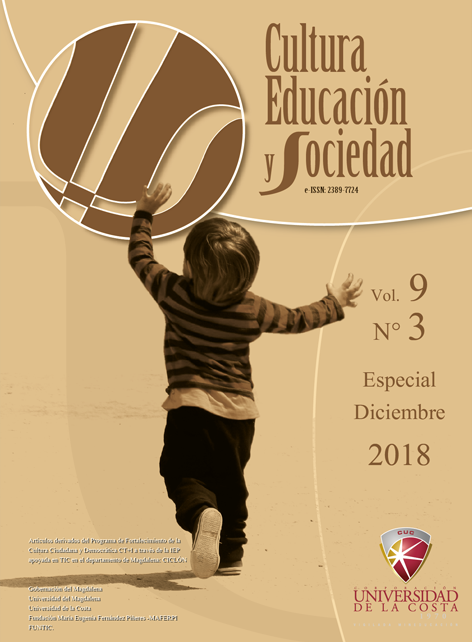Citizen culture and student coexistence from the use of research as a pedagogical strategy supported by Information and communication technologies
DOI:
https://doi.org/10.17981/cultedusoc.9.3.2018.10Keywords:
Citizen culture, School life, Research as a pedagogical strategy, Information and communication technology.Abstract
The integration into the curriculum of research as a pedagogical strategy (IEP) and the use of information and communication technologies (ICT) generates novel proposals from which it is proposed to impact the student community in the development of citizen culture and the improvement of school coexistence. The purpose of this research is to generate citizen culture and student coexistence from the use of the IEP supported by ICT. The study is of a qualitative, proactive type. The population consisted of 190 students of the Otilia Mena Álvarez Agricultural Educational Institution. For data collection, a diagnosis was made based on the ICT of the citizen culture and school coexistence in the institution, and work tables and workshops of contextualized experiences were developed with students, teachers and parents. From the research, as a pedagogical strategy it was possible to foster the critical reflection of the students in the face of the problem of school coexistence and civic culture highlighting tolerance, good personal relationships and respect for individual differences.
Downloads
References
Alfaro, A. C., Peralta, G. M., Hurtado, J. L. G., & Contreras, Y. C. (2014). La convivencia y la mediación de conflictos como estrategia pedagógica en la vida escolar. Revista Panorama Económico, (22), 169-190.
Belalcazar, C. y Molina, M. (2017). Socialización de experiencias educativas mediadas por TIC en pro de la convivencia y cultura de paz. Tesis de Maestría, Centro de tecnologías de la academia. Universidad de la Sabana, p.p. 2-135.
Bolívar, A. (2004). Ciudadanía y escuela pública en el contexto de diversidad cultural. Revista Mexicana de investigación Educativa, 9 (20), 15-38.
Colciencias (2011). Las Comunidades de Aprendizaje, Prácticas, Saber, Conocimiento y Trasformación Apoyadas en las Nuevas Tecnologías de la Información y la Comunicación. Bogotá D.C.
Garrell, T. (2009). Aprender a convivir. Laboratorio Educativo. Caracas.
Hernández G. de V. J; Alvarado P., L. y Velazco G., J. (2013). Participación ciudadana, tecnologías de información-comunicación y opinión pública. TEACS, año 5, No. 11, ISSN Nº 1856-9773
Illera, M. (2005) Convivencia y cultura ciudadana: Dos pilares fundamentales del derecho policivo. Revista de Derecho. (23), 240-259.
Marrugo, G., Gutiérrez, J., Concepción, I. Concepción, M. (2016). Estrategia de Convivencia Escolar Para la Formación de Jóvenes Mediadores de Conflictos. Escenarios, 14 (1), p,p. 72-84
Megías, M. (2011). La convivencia escolar y cómo resolver los conflictos y la violencia en el aula. Granada: ADICE.
Mejía, M. & Manjarrez, M. (2010). La investigación como estrategia pedagógica: Una apuesta por construir pedagogías críticas en el siglo XXI. Programas ONDAS- Colciencias.
Mena, I., Romagnoli, C. & Valdés, A. (2006). Convivencia escolar. Documento Valoras UC.
Ministerio de Educación Nacional. 2006. Plan Nacional Decenal de Educación PNDE 2006-2016. Bogotá (Colombia). Disponible en: http://www.mineducacion.gov.co/1621/articles-312490_archivo_pdf_plan _decenal.pdf. Consultado el 15.07.2015
Ramírez, C. (2010), “Las TICS en el Aula”, NNTT, Granada. 2010
Romero-Acosta, K., & Contreras Banques, E. (2015). Revisión teórica sobre el post-conflicto: una oportunidad para empoderar a mujeres víctimas de desplazamiento. Cultura Educación y Sociedad, 6(1). Recuperado a partir de https://revistascientificas.cuc.edu.co/culturaeducacionysociedad/article/view/757
Ruiz-Silva, A. & Choux, E. (2005). La formación de competencias ciudadanas. Bogotá: Asociación Colombiana de Facultades de Educación ASCOFADE.
Samper, J. & Maussa, E. (2014). Desarrollo moral y competencias ciudadanas en la juventud universitaria. Jurídicas CUC, 10 (1), 43 - 60.
Valenzuela, G. - Rochin, L. (2013). Libertad de expresión y su impacto en la democracia. Jurídicas CUC, 9 (1), 89 – 100.
Villa, I.. (2013). Competencia Lectora y el Uso de las Nuevas Tecnologías de la Información y Comunicación Reading competition and the use of new technologies of information, 11(1), 7–22.
Downloads
Published
How to Cite
Issue
Section
License
Copyright (c) 2018 CULTURA EDUCACIÓN Y SOCIEDAD

This work is licensed under a Creative Commons Attribution-NonCommercial-NoDerivatives 4.0 International License.
![]()
Creative Commons 2020 CULTURA EDUCACIÓN Y SOCIEDAD
This article is under international license Creative Commons Reconocimiento-NoComercial-SinObrasDerivadas 4.0.
The published articles are the sole responsibility of their authors and do not necessarily reflect the opinions of the editorial committee.
CULTURA EDUCACIÓN Y SOCIEDAD respects the moral rights of its authors, who assign to the editorial committee the patrimonial rights of the published material. In turn, the authors inform that this work is unpublished and has not been previously published.
All articles are under a:
Licencia Creative Commons Atribución-NoComercial-SinDerivadas 4.0 Internacional.
![]()


 English
English
 Español (España)
Español (España)




_12.53_.27_p_. m_._3.png)





_12.57_.35_p_. m_._3.png)
_12.50_.37_p_. m_._3.png)



